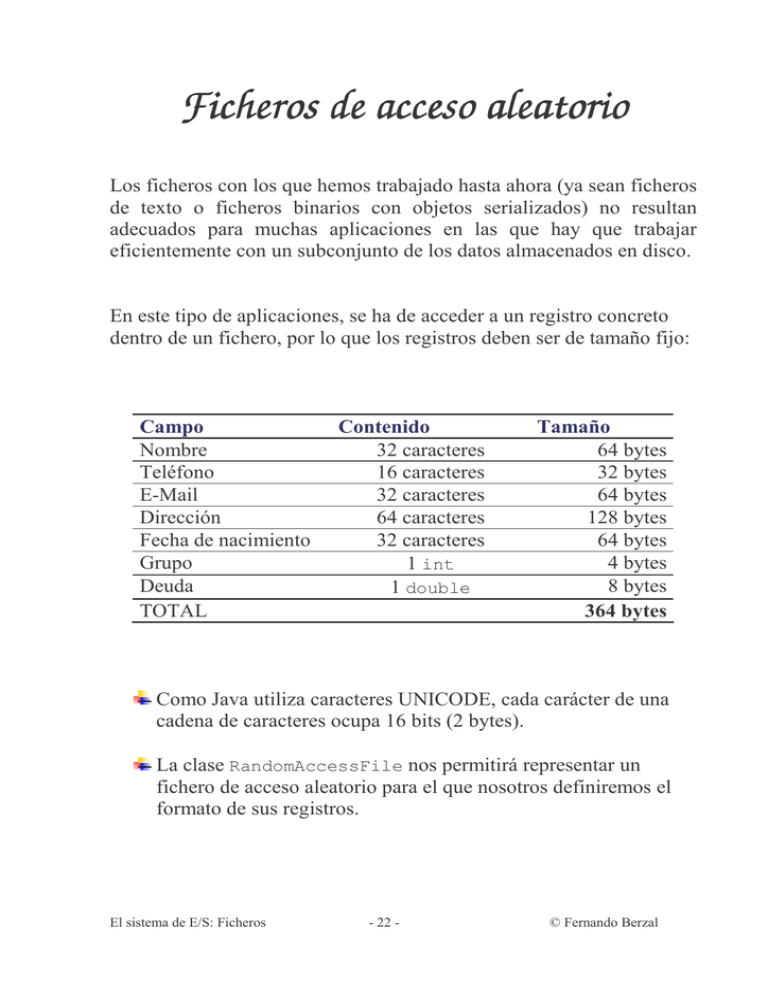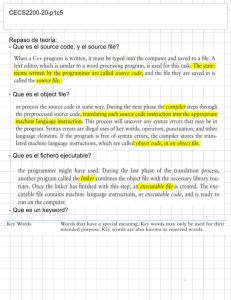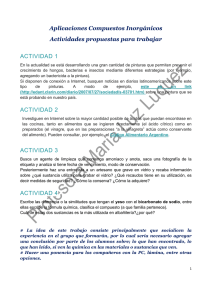Ficheros de acceso aleatorio
Anuncio

Ficheros de acceso aleatorio
Los ficheros con los que hemos trabajado hasta ahora (ya sean ficheros
de texto o ficheros binarios con objetos serializados) no resultan
adecuados para muchas aplicaciones en las que hay que trabajar
eficientemente con un subconjunto de los datos almacenados en disco.
En este tipo de aplicaciones, se ha de acceder a un registro concreto
dentro de un fichero, por lo que los registros deben ser de tamaño fijo:
Campo
Nombre
Teléfono
E-Mail
Dirección
Fecha de nacimiento
Grupo
Deuda
TOTAL
Contenido
32 caracteres
16 caracteres
32 caracteres
64 caracteres
32 caracteres
1 int
1 double
Tamaño
64 bytes
32 bytes
64 bytes
128 bytes
64 bytes
4 bytes
8 bytes
364 bytes
Como Java utiliza caracteres UNICODE, cada carácter de una
cadena de caracteres ocupa 16 bits (2 bytes).
La clase RandomAccessFile nos permitirá representar un
fichero de acceso aleatorio para el que nosotros definiremos el
formato de sus registros.
El sistema de E/S: Ficheros
- 22 -
© Fernando Berzal
Registro
import java.io.*;
import java.text.DateFormat;
public class Registro extends Contacto
{
public final static int DIM = 364;
// Lectura
public void read (RandomAccessFile file)
throws IOException, java.text.ParseException
{
DateFormat df;
setNombre
setTelefono
setEmail
setDireccion
(
(
(
(
readString
readString
readString
readString
(file,
(file,
(file,
(file,
32)
16)
32)
64)
);
);
);
);
df = DateFormat.getDateInstance(DateFormat.LONG);
setNacimiento ( df.parse(readString(file,32)) );
setGrupo(file.readInt());
setDeuda(file.readDouble());
}
private String readString
(RandomAccessFile file, int dim)
throws IOException
{
char campo[] = new char[dim];
for (int i=0; i<dim; i++)
campo[i] = file.readChar();
return new String(campo).replace('\0',' ');
}
El sistema de E/S: Ficheros
- 23 -
© Fernando Berzal
// Escritura
public void write (RandomAccessFile file)
throws IOException
{
DateFormat df;
writeString
writeString
writeString
writeString
(file,
(file,
(file,
(file,
getNombre(),
getTelefono(),
getEmail(),
getDireccion(),
32);
16);
32);
64);
df = DateFormat.getDateInstance(DateFormat.LONG);
writeString (file, df.format(getNacimiento()), 32);
file.writeInt
( getGrupo() );
file.writeDouble ( getDeuda() );
}
private void writeString
(RandomAccessFile file, String str, int dim)
throws IOException
{
StringBuffer buffer = new StringBuffer();
if (str!=null)
buffer.append(str);
buffer.setLength(dim);
file.writeChars(buffer.toString());
}
}
El sistema de E/S: Ficheros
- 24 -
© Fernando Berzal
Fichero de contactos
import java.io.*;
public class Contactos
{
// Fichero de acceso aleatorio
private RandomAccessFile file;
// Apertura del fichero
public void abrir()
throws IOException
{
file = new RandomAccessFile("clientes.dat","rw");
}
// Cierre del fichero
public void cerrar()
throws IOException
{
if (file!=null)
file.close();
}
// Escribir un registro
// en la posición actual del cursor
public void escribir (Registro registro)
throws IOException
{
if (file!=null)
registro.write(file);
}
El sistema de E/S: Ficheros
- 25 -
© Fernando Berzal
// Escribir un registro en una posición cualquiera
public void escribir (Registro registro, int pos)
throws IOException
{
if (file!=null) {
file.seek ( (pos-1)*Registro.DIM );
escribir(registro);
}
}
// Leer del fichero el registro
// que se encuentra en la posición actual del cursor
public Registro leer ()
{
Registro registro = null;
if (file!=null) {
try {
registro = new Registro();
registro.read(file);
} catch (Exception error) {
registro = null;
}
}
return registro;
}
// Leer del fichero un registro cualquierta
// (el parámetro indica la posición del registro)
public Registro leer (int pos)
throws IOException
{
if (file!=null) {
file.seek ( (pos-1)*Registro.DIM );
}
return leer();
}
}
El sistema de E/S: Ficheros
- 26 -
© Fernando Berzal
Ejemplos de uso
Registro contacto;
Contactos agenda;
agenda = new Contactos();
Escritura secuencial de datos
agenda.abrir();
agenda.escribir( contacto1 );
agenda.escribir( contacto2 );
...
agenda.cerrar();
Lectura secuencial del fichero
agenda.abrir();
do {
contacto = agenda.leer();
...
} while (contacto!=null);
agenda.cerrar();
Acceso aleatorio a los datos (lectura y actualización)
agenda.abrir();
contacto = agenda.leer(2);
contacto.setNombre("JC");
agenda.escribir(contacto,2);
agenda.cerrar();
El sistema de E/S: Ficheros
- 27 -
© Fernando Berzal

![application/msword (Español) FORMAT ARTICOLI.doc [24,00 kB]](http://s2.studylib.es/store/data/003360457_1-c07fae612c38a3e99101f022cd743479-300x300.png)

